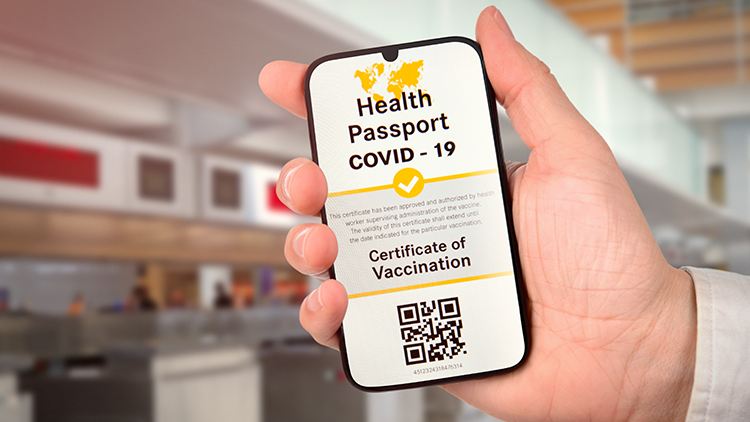
With the world being told that so-called ‘vaccine passports’ will be required for all international travel in future, and in many countries even to enter shops, restaurants, bars, gyms, hotels, theatres, concerts and sports events, the impression we are being given is that the measure is a direct result of the coronavirus pandemic. In Europe, however, which hosts 8 of the top 10 pharmaceutical exporting countries, planning for vaccine passports began at least 20 months prior to the start of the COVID-19 outbreak. Apparently, the pandemic conveniently provided European politicians with the ‘excuse’ they needed to introduce the idea.
The ‘European Commission’ – the executive body of Europe – first published a proposal for vaccine passports on 26 April 2018. Buried deep in a document dealing with ‘Strengthened Cooperation against Vaccine Preventable Diseases’, the proposal was essentially ignored by the mainstream media.
A roadmap document issued in early 2019 subsequently set out specific plans for implementing the European Commission’s proposal. The primary action listed in the roadmap was to “examine the feasibility of developing a common vaccination card/passport” for European citizens that is “compatible with electronic immunization information systems and recognized for use across borders.” The plan aimed for a legislative proposal to be issued in Europe by 2022.
Interestingly, the roadmap uses several terms that, while relatively uncommon in most countries prior to the pandemic, have since become heard on a daily basis in the mainstream media. Perhaps the most notable of these is ‘vaccine hesitancy’. Supporting European countries in “countering vaccine hesitancy” is listed in the document as one of the key action points.
The possibility of pandemics and “unexpected outbreaks” occurring is also referred to in the roadmap. Revealingly, specific reference is made to supporting the authorization of “innovative vaccines, including for emerging health threats.” Stating that the “vaccine manufacturing industry” has a “key role” in meeting the aims described in the document, the roadmap lists “improving EU manufacturing capacity” and stockpiling vaccines as further action points to be considered. Towards strengthening “existing partnerships” and “collaboration with international actors and initiatives,” the roadmap also refers to a global vaccination summit meeting that took place in September 2019. A close examination of the attendees and subject matter for this meeting is revealing.
The 2019 Global Vaccination Summit
Unreported by most mainstream media outlets, a ‘Global Vaccination Summit’ was hosted in Brussels, Belgium, on 12 September 2019. Organized by the European Commission in cooperation with the World Health Organization, the meeting took place just 3 months before the coronavirus outbreak began. Significantly, this was also only 36 days before the now infamous coronavirus outbreak simulation exercise, supported by the Bill & Melinda Gates Foundation, the World Economic Forum, and Johns Hopkins Bloomberg School of Public Health, which took place on 18 October 2019.
An invitation-only event, the vaccination summit participants included political leaders, high-level representatives from the United Nations and other international organizations, health ministries, leading academics, scientists and health professionals, the private sector, and non-governmental organizations.
The summit was structured around three round tables entitled ‘In Vaccines We Trust’, ‘The Magic Of Science’, and ‘Vaccines Protecting Everyone, Everywhere’. Notable panel members for these round tables included Nanette Cocero, Global President of Pfizer Vaccines; Dr. Seth Berkley, CEO of GAVI, the Global Vaccine Alliance – an organization that has received vast amounts of funding from the Bill & Melinda Gates Foundation; and Joe Cerrell, the Bill & Melinda Gates Foundation’s Managing Director for Global Policy and Advocacy.
Pandemic planning was clearly in evidence at this summit meeting. Key documents distributed to the participants included reports on ‘Pandemic influenza preparedness planning’, ‘A pandemic influenza exercise for the European Union’, ‘Avian Influenza and Influenza Pandemic Preparedness Planning’, ‘Pandemic influenza preparedness and response planning’, ‘Towards sufficiency of Pandemic Influenza Vaccines in the EU’, and ‘A “Public Private Partnership” on European Pandemic influenza vaccines’. Across all these documents, the goal of strengthening collaboration with the pharmaceutical industry is repeatedly stressed, as also is the message that a global pandemic was now inevitable.
Vaccine passports: who really benefits?
Who really benefits from vaccine passports? Certainly not ordinary people, for whom sharing their health records and other personal data could soon become mandatory merely for participation in society. Instead, the chief beneficiary will be the multinational pharmaceutical industry. With global drug and vaccine sales already forecast to reach $1.5 trillion this year, pharmaceutical companies and their investors are salivating at the prospect of vaccine passports becoming mandatory worldwide.
The total market for COVID-19 vaccines is predicted to be worth $100 billion in sales and $40 billion in post-tax profits. Annual vaccinations against mutations of the coronavirus could raise these numbers still further. Unless we resist vaccine passports and instead ‘vote for reason’, drug and vaccine makers could force the world into long-term economic and political dependency. Our urgent goal must therefore be to replace the greed-driven pharmaceutical ‘business with disease’ with a healthcare system based on truly preventive approaches. Accepting the pharmaceutical industry’s alternative to this is simply unthinkable.